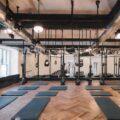Equinox, the high-end fitness club known for its dedication to a holistic approach to wellness, has recently made headlines. The brand has introduced new uniforms and, controversially, asked its trainers to ‘lose the muffin top’ before donning them. This statement has sparked a discussion about body image and fitness industry standards. In this article, we delve into the implications of such requirements and what it means for both the trainers and the clientele of Equinox.
Understanding the ‘Muffin Top’ Controversy
‘Muffin top’ is a colloquial term used to describe the excess weight that spills over the waistline of pants or skirts, much like the top of a muffin over its paper casing. The term has become a focal point in the conversation about body positivity and self-acceptance. Equinox’s call for their trainers to lose any semblance of a muffin top has not only raised eyebrows but also important questions about the expectations set forth in the fitness world.
Equinox’s Brand and Body Image
Equinox has always marketed itself as a brand that promotes not just fitness, but a luxurious lifestyle. With its sleek design and exclusive clientele, the company represents a certain aspirational aesthetic. However, this latest move has people questioning whether the brand is promoting an unhealthy body image, and whether fitness professionals should be judged on appearance rather than their expertise and ability to guide others to healthier lives.
The Repercussions for Fitness Trainers
Equinox’s directive puts its trainers in a tough spot. On one hand, they are expected to be the epitome of health and fitness. On the other, they are now facing added pressure to meet a specific physical standard that may not be attainable or healthy for everyone. The emphasis on appearance over ability could potentially lead to negative self-esteem and body image issues among trainers.
Client Expectations and Realistic Body Goals
Equinox’s clientele may have certain expectations when it comes to the appearance of their trainers. However, it’s crucial for the overall fitness industry to foster realistic and healthy body goals. The focus should be on functional fitness and health rather than solely on physical appearance. The initiative by Equinox could inadvertently perpetuate unrealistic body standards for both trainers and clients alike.
Navigating the Fine Line
While it’s important for fitness professionals to lead by example, there’s a fine line between encouraging health and propagating unrealistic beauty standards. Equinox’s move to update its uniforms and the conditions that come with them is a clear example of how easily that line can be blurred. The discussion it has prompted is an essential one, ensuring that as a society, we strive for health and wellness in a way that is inclusive and accepting of diverse body types.
FAQ About Equinox’s New Uniform Policy
What has been the public reaction to Equinox’s new uniform policy?
The public reaction has been mixed, with some supporting the brand’s high standards and others criticizing it for promoting an unrealistic and potentially harmful body image.
Is it common for fitness clubs to have appearance standards for their trainers?
Yes, many fitness clubs have guidelines on the professional appearance of their trainers, but Equinox’s specific focus on the ‘muffin top’ is unusual and controversial.
How might this policy affect the mental health of Equinox trainers?
This policy could contribute to stress and anxiety among trainers who feel pressured to meet specific body image standards, potentially affecting their mental health and job performance.
Could Equinox’s policy change how other fitness clubs approach trainer appearance?
It’s possible that other clubs could adopt similar appearance policies, particularly if they believe it will give them an edge in a competitive market. However, they may also face backlash as seen with Equinox.
How can fitness professionals advocate for healthy body standards in the industry?
Fitness professionals can advocate for healthy body standards by focusing on functional training, celebrating diverse body types, and promoting a message of overall wellness rather than just appearance.









